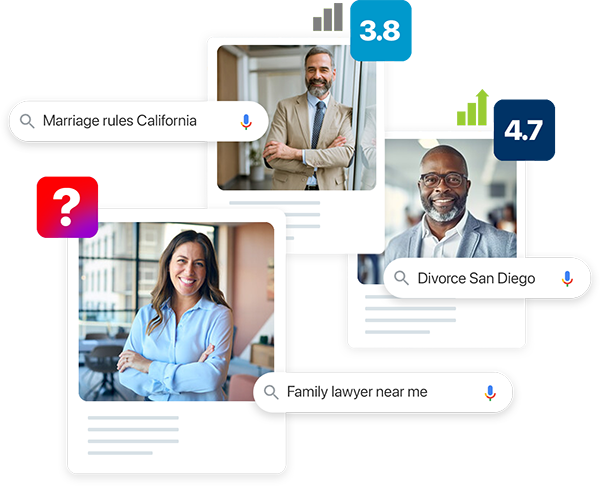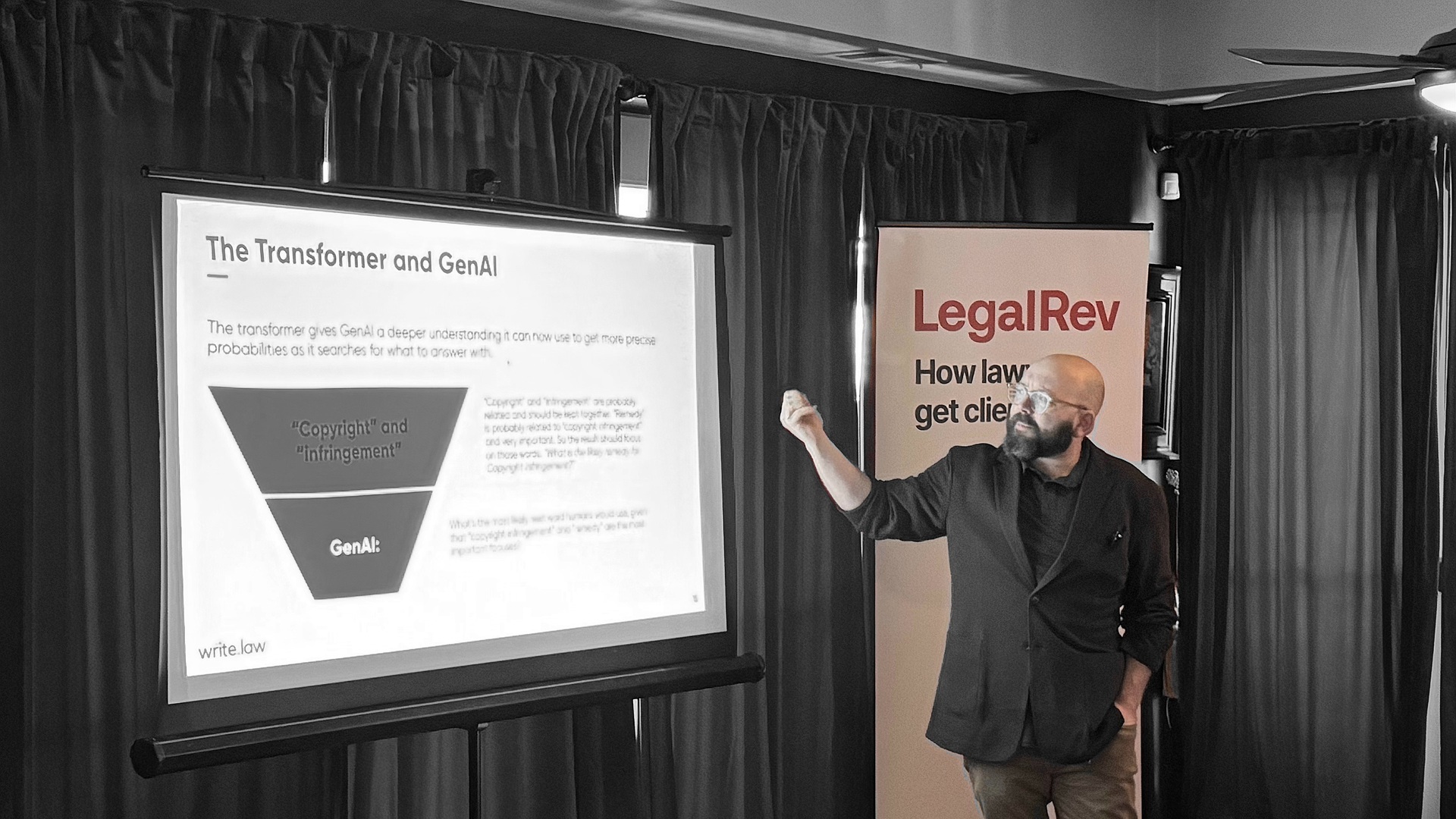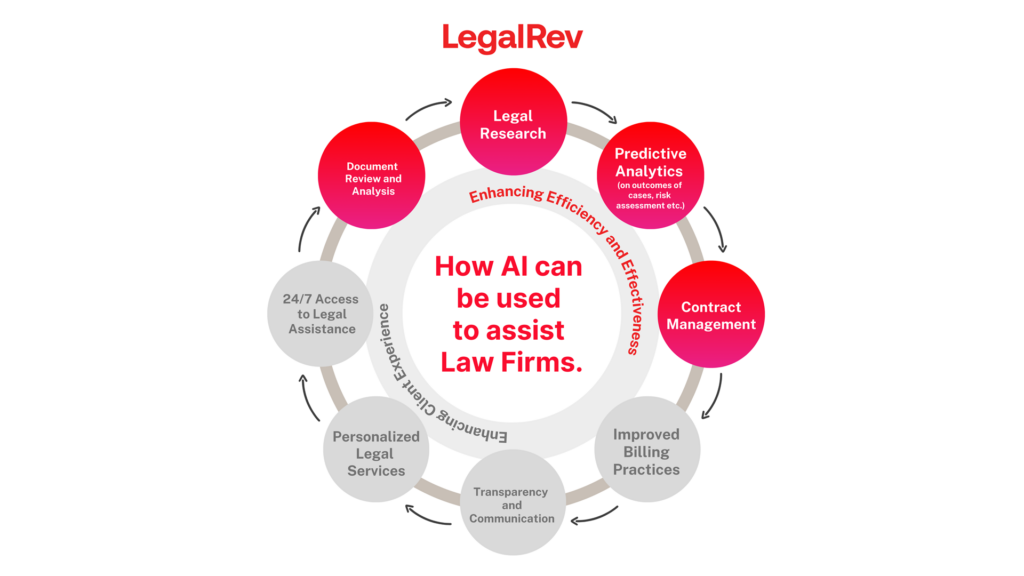Last week we held a CLE ‘Lunch and Learn’ in Nevada on ‘Preparing Your Law Firm For An AI Future’ – and were thrilled to share a great lunch with some of the Nevada law community while listening to brilliant speaker, Professor Joe Regalia. Joe shared some excellent insights and recommendations about this important topic.
Why CLE and AI Knowledge Matter for Lawyers
At LegalRev, we believe that staying informed isn’t just a best practice—it’s essential for success in today’s rapidly evolving legal landscape. We use our newsletters to try and share important information and updates in an easy-to-digest way for our clients and others. But we also recently hosted an in-person Continuing Legal Education (CLE) lunch event in Nevada, focusing on one of the most pressing topics in the profession: the use of AI in legal practice.
We know that lawyers are dedicated and busy professionals; CLE requirements ensure that attorneys stay up-to-date with any changes in the law and best practices, as well as interesting discussions on ethics. Beyond meeting state bar requirements, CLE is also an opportunity to sharpen skills, adapt to industry shifts, and gain a competitive edge – ultimately benefiting both lawyers and their clients.
And while CLE can cover a multitude of topics in the fascinating and ever-evolving world of law, as we move into 2025, one of the most significant shifts in legal practice is the increasing role of artificial intelligence.

Find out where you stand with a local keyword report.
Why Lawyers Need to Understand AI
AI is transforming the legal profession from research and document drafting to more timely client communication and case strategy. Whether you’re actively using AI tools or just starting to tentatively dip in your toe, and explore the possibilities, understanding its capabilities—and the risks and limitations—is critical.
Here are some key takeaways from our recent CLE event with Professor Joe Regalia:
- Efficiency and Automation – AI-powered tools can dramatically reduce the time spent on research, contract review, and document drafting, freeing up more time for high-value legal work.
- Risk and Ethical Considerations – The use of AI raises important questions about confidentiality, bias, and attorney oversight. Lawyers need to ensure they comply with ethical guidelines when integrating AI into their practice.
- Enhancing Client Services – AI can improve responsiveness, case analysis, and even predictive analytics, helping firms provide more accurate and strategic legal counsel.
- Staying Competitive – As more firms adopt AI, those who don’t risk falling behind. Understanding how to leverage AI responsibly can be a key differentiator in an increasingly tech-driven legal market.
- Effective prompts can give you a competitive edge – knowing how to improve your prompts into chat AI’s can really impact the quality of your responses.
How Can AI Help Your Legal Practice?
Artificial Intelligence (AI) is transforming the legal industry by enhancing efficiency, effectiveness, and client experience, while also offering financial benefits to law firms. By automating routine tasks to help with efficiency and decision-making, AI is reshaping traditional legal practices… and reshaping them fast.
Here are some of the ways that AI could help your law firm:
Enhancing Efficiency and Effectiveness
- Document Review and Analysis
AI-powered tools can analyze and review large volumes of legal documents much faster, significantly reducing the time lawyers spend on manual document review, allowing them to focus on more complex tasks. For instance, AI platforms like Ivo automate contract reviewing tasks, and claim to improve contract review speeds and accuracy. - Legal Research
AI can quickly sift through vast databases to find relevant case law, statutes, and legal precedents. This not only saves time but also ensures that lawyers have access to the most pertinent information, enhancing the quality of their legal arguments. (NOTE – many AI models are only trained on public data up to 12 months ago, so any more recent legal statutes may not be included.) - Predictive Analytics
By analyzing historical data, AI can predict potential outcomes of legal cases, helping lawyers consider their options and develop more effective strategies. This predictive capability allows for better risk assessment and more informed decision-making. - Contract Management
AI tools can automate the creation, review, and management of contracts – saving time and ensuring consistency and compliance. They can also flag potential issues or deviations from standard terms, reducing the risk of errors and omissions. Companies like Robin AI have developed tools that scan contracts and suggest edits. These tools have been trained on vast quantities of legal documents and can address queries and make recommendations for variations in record time.
Enhancing Client Experience
- 24/7 Access to Legal Assistance
AI-powered chatbots and virtual assistants can provide clients with immediate responses to common legal inquiries, so they can offer support in a timely, but also personalized, manner. - Personalized Legal Services
AI can analyze client data to offer tailored legal advice and solutions, providing services that are customized to meet the specific needs of each client. - Transparency and Communication
AI tools can keep clients informed about the status of their cases through automated updates and notifications, enhancing transparency and trust in the legal process (whilst also saving your team time, as they don’t have to answer common inquiries).
Financial Benefits
- Cost Reduction
By automating routine tasks, AI reduces the need for extensive human resources. This allows law firms to allocate resources more effectively and offer competitive pricing to clients. - Increased Revenue
With AI handling time-consuming tasks, lawyers can take on more cases or focus on higher-value work, potentially increasing the firm’s revenue. - Improved Billing Practices
AI can assist in tracking billable hours more accurately and efficiently, ensuring that clients are billed appropriately and that the firm maximizes its earnings.
Conclusion
The integration of AI into law firms offers numerous advantages, including enhanced efficiency, improved client experience, and financial benefits. By embracing AI technologies, law firms can streamline operations, provide better services to clients, and achieve greater financial success.
Want to attend a LegalRev CLE event in your area?
There were definitely some valuable discussions sparked about both the potential and the challenges of AI in legal practice at our Nevada event. If you missed it, don’t worry—we’ll be sharing insights and resources throughout the year to help you stay informed.
We are also planning on running some other national CLE events in the coming year, so if you’d like to hear more about those or if you’re interested in learning more about AI, SEO, or digital marketing for your law firm, do get in touch.






